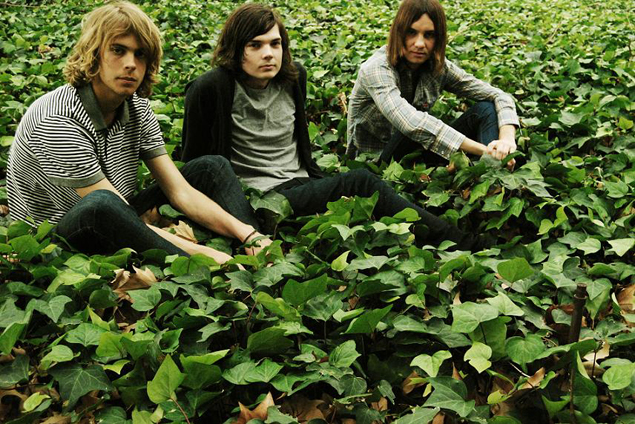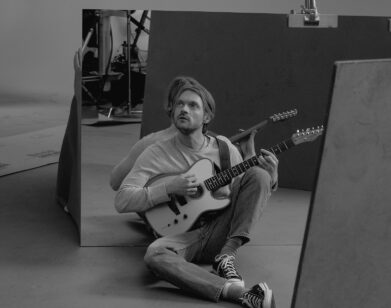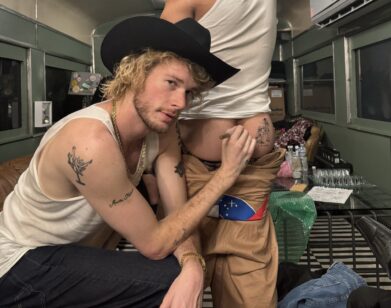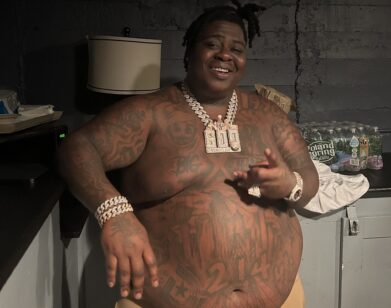Tame Impala’s Loner Notes

ABOVE: TAME IMPALA
When Interview sat down with Tame Impala frontman/lead creative force Kevin Parker, he had just played a sold-out show at the Music Hall of Williamsburg and the band was about to hit the road again. He was tired but relieved after finishing an album that took two years of grueling, perfectionistic studio work to create. The show had been a smash, and even though Parker complained about feeling under the weather (“Hope my voice didn’t sound too terrible”), no one in the audience seemed to notice.
Now, a few weeks later, the Perth-based rockers can rest easy. Their sophomore LP, Lonerism, has finally dropped, and it’s garnered heaps of deserved praise. Expanding on the heady, heavy jams that made InnerSpeaker a critical smash, the album justifies the band’s vision of a wholly contemporary psych-rock opus. It’s unmistakably a bigger, badder, and more ambitious LP than anything the band has previously attempted, with songs that oscillate between tightly wound rockers and cosmic freak-outs, often over the course of the same track. Below, we talk to Parker about the making of Lonerism, the problem with encores, and the lengths a kid will go through to see a great gig.
NATHAN REESE: So I was able to catch your show the other night, and at one point someone threw a rugby ball onstage.
KEVIN PARKER: That was actually an AFL—Australian Football League—ball. We’ve had it on tour. It was probably one of our friends.
REESE: So getting things thrown at you by fans isn’t a regular occurrence?
PARKER: Right. No, that was our ball. [laughs] I didn’t expect it to be hurled on stage, though. I saw it land right on one of my effects pedals. Normally we don’t get much of that. Sometimes hats.
REESE: You mentioned that this show was your first encore ever. How did you manage to avoid them all this time?
PARKER: Well actually, it’s technically not our first one, I’ve suddenly realized. It’s really our second. The first one we ever did was when Craig Nicholls from The Vines was backstage with us, and we were kind of drunk by the end of the gig. Someone thought it would be a good idea if Craig would get back up and sing “Get Free” and we’d be the backing band. So I jumped on the drums—that was our first.
Anyway, we used to just make it a thing that we never did them. I’ve found them to be so obviously premeditated. It sort of kills the idea of an encore, where they’re not meant to come back on onstage and if they do, it’s this amazing thing. Nowadays, it’s like “goodbye” [claps lightly for a few seconds] and then—oh, they’re back again! But now it’s become where it’s actually harder not to do them than to just do them. So now where we stand, is that if the fans make a big enough noise, we’ll come back.
REESE: That’s a dangerous precedent.
PARKER: Well they won’t know if we’re going to come back, because they’ll think we don’t do them.
REESE: So, switching gears, tell me about the new album. What’s changed since InnerSpeaker?
PARKER: Well I think [Lonerism] is loads different, but that’s just me. I’ve been working on it so long and so intensely that I’ve lost all perspective of what it sounds like to the outside world, or to someone else who is hearing it for the first time. For me, the songs, the song structures, the sounds, everything is different. Now there are a lot more instruments. More synthesizers. The guitars wait in the wings for a lot of the songs, and then suddenly come in right at the end. Each instrument is treated like a weapon. I would say it’s more orchestral, but that’s completely wanky [laughs]—orchestrated, that’s a better word.
REESE: What does the title refer to?
PARKER: It was just this word that popped into my head. It was the best thing I could think of to describe the atmosphere of the album.
REESE: I remember reading interviews when the last one was coming out, and you said you’d already started this one. How long have you been working on the record?
PARKER: Well, since the end of the last one, literally every day for two years. It’s really drained me. I haven’t even been thinking about recording music for a couple of months now, because I’m so exhausted creatively and mentally. For the first time in 10 years I can not think about music for a whole day and not feel weird that I haven’t been working on a song.
REESE: Is it nice being able to finally play the songs live?
PARKER. Yeah, it’s always a different experience playing them live than recording them. Sometimes it feels like a different song. There’s always the process of adapting it to a live environment. I usually like to wait until the song has been released in the studio form until we play it live, because I hate the idea that the first time someone hears a song it will be a crappy live recording that doesn’t sound the way it’s meant to. [Now] we’re trying to get as much from the songs, musically, as we can and hoping that translates to the audience, so we’re not just robots on stage.
REESE: The album alternates between expansive, psychedelic pieces and big pop hooks. How do you balance the two?
PARKER: Melodically, Lonerism is definitely poppier, but not many of the songs have that verse-chorus-verse-chorus pop structure. I just forgot about that whole thing. The production is meant to be a bit fucked-up and weird. I like the way those elements play off each other. Really cheesy pop melodies in this bed of craziness.
REESE: Your publicist mentioned that some high-school kids traveled for eight hours without tickets to see your show, and you eventually added them to your guest list. What do you take away from that sort of dedication?
PARKER: Their expectations are a lot higher than someone who is just going because their friend is going. I guess that just means that they’re really into the music, and us as artists. So I just hope that if we get up there, and do honestly what we like to do, they’ll appreciate it.
REESE: Plus, they’re probably just stoked to be added to your guest list.
PARKER: Well, yeah, that too.
REESE: Had you ever done anything like that growing up?
PARKER: [laughs] Yeah, I went to a White Stripes concert by myself using my brother’s ID. I had my final high school ancient history exam, the White Stripes were coming, and I was like, “I’m not missing this gig.” I was like 17 or something—I wasn’t meant to be in the venue. I lined up by myself for like an hour, got to the front of line, and the bouncer looks at my brother’s driver’s license and looks and me. I was like, “I dyed my hair.” He looked at me again, stamped my wrist, and I got in. I was like, “Fuck yeah!” It was a really good gig.
LONERISM IS OUT NOW. FOR MORE ON TAME IMPALA, VISIT THEIR WEBSITE.






